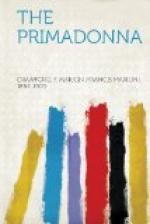A week after her arrival in London, Margaret was alone at her piano and Lushington was announced. Unlike the majority of musicians in real fiction she had not been allowing her fingers to ’wander over the keys,’ a relaxation that not seldom leads to outer darkness, where the consecutive fifth plays hide-and-seek with the falling sub-tonic to superinduce gnashing of teeth in them that hear. Margaret was learning her part in the Elisir d’Amore, and instead of using her voice she was whistling from the score and playing the accompaniment. The old opera was to be revived during the coming season with her and the great Pompeo Stromboli, and she was obliged to work hard to have it ready.
The music-room had a polished wooden floor, and the furniture consisted chiefly of a grand piano and a dozen chairs. The walls were tinted a pale green; there were no curtains at the windows, because they would have deadened sound, and a very small wood fire was burning in an almost miniature fireplace quite at the other end of the room. The sun had not quite set yet, and as the blinds were still open, a lurid glare came in from the western sky, over the houses on the opposite side of the wide square. There had been a heavy shower, but the streets were already drying. One shaded electric lamp stood on the desk of the piano, and the rest of the room was illuminated by the yellowish daylight.
Margaret was very much absorbed in her work, and did not hear the door open; but the servant came slowly towards her, purposely making his steps heard on the wooden floor in order to attract her attention. When she stopped playing and whistling, and looked round, the man said that Mr. Lushington was downstairs.
‘Ask him to come up,’ she answered, without hesitation.
She rose from the piano, went to the window and looked out at the smoky sunset.
Lushington entered the room in a few moments and saw only the outline of her graceful figure, as if she were cut out in black against the glare from the big window. She turned, and a little of the shaded light from the piano fell upon her face, just enough to show him her expression, and though her glad smile welcomed him, there was anxiety in her brown eyes. He came forward, fair and supernaturally neat, as ever, and much more self-possessed than in former days. It was not their first meeting since she had landed, for he had been to see her late in the afternoon on the day of her arrival, and she had expected him; but she had felt a sort of constraint in his manner then, which was new to her, and they had talked for half an hour about indifferent things. Moreover, he had refused a second cup of tea, which was a sure sign that something was wrong. So she had asked him to come again a week later, naming the day, and she had been secretly disappointed because he did not protest against being put off so long. She wondered what had happened, for his letters, his cable to her when she had left America, and the flowers he had managed to send on board the steamer, had made her believe that he had not changed since they had parted before Christmas.




